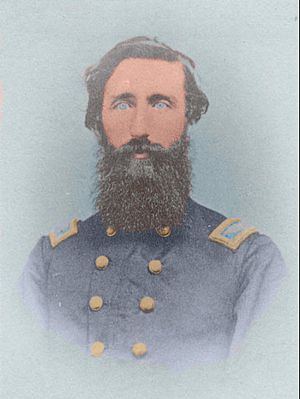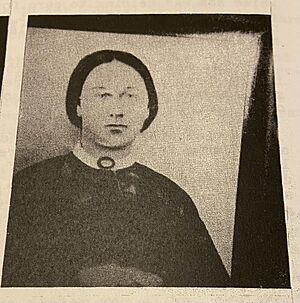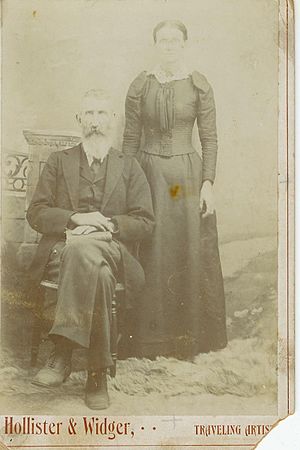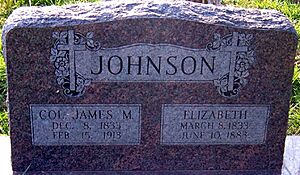James M. Johnson (politician) facts for kids
Quick facts for kids
Colonel James M. Johnson
|
|
|---|---|

Johnson during the Civil War
|
|
| 2nd Lieutenant Governor of Arkansas | |
| In office 1868–1871 |
|
| Governor | Powell Clayton |
| Preceded by | Calvin C. Bliss |
| Succeeded by | Volney V. Smith |
| 10th Secretary of State of Arkansas | |
| In office 1871–1874 |
|
| Governor | Ozra Amander Hadley Elisha Baxter |
| Preceded by | Robert J. T. White |
| Succeeded by | Benton B. Beavers |
| Personal details | |
| Born | December 8, 1832 Warren County, Tennessee, US |
| Died | February 15, 1913 (aged 80) Madison County, Arkansas, US |
| Political party | Liberal Republican/Brindle Tail |
| Spouses | Elizabeth Johnson (m. 1850; died 1883) Jennie A. Mullins (m.1893) |
| Children | 8 |
| Profession | Farmer, Physician, Soldier, Politician |
| Military service | |
| Allegiance | |
| Branch/service | United States Volunteers |
| Years of service | 1863-65 |
| Rank | |
| Commands | 1st Arkansas Infantry Regiment 1st Brigade, 3rd Division, VII Corps Department of Arkansas |
| Battles/wars | American Civil War
|
James M. Johnson (born December 8, 1832 – died February 15, 1913) was an American soldier and politician from Arkansas. During the American Civil War, he supported the Union. He served as an officer in the Union Army. He helped several generals and later led the 1st Arkansas Infantry Regiment (Union). He eventually became a brevet brigadier general, which is an honorary higher rank.
After the war, Johnson became the 2nd Lieutenant Governor of Arkansas. Later, he served as the 10th Secretary of State of Arkansas. While in Arkansas politics, Johnson created his own group within the Arkansas Republican Party. This group disagreed with Governor Powell Clayton's ideas. Johnson and Clayton even tried to remove each other from office with false accusations. Although Johnson was never found guilty, he lost his political support and left politics.
Contents
Early Life and Education
James Madison Johnson was born on December 8, 1832, in Warren County, Tennessee. In 1836, his family moved to Madison County, Arkansas. James probably learned at home when he was young. This was because the first important schools in Northwest Arkansas, Ozark Institute and Arkansas College, opened later. He later attended both of these schools. Arkansas College was the first school in Arkansas where students could get a doctor's degree. We don't know if Johnson finished this course.
At the Ozark Institute, he might have met Isaac Murphy. Murphy was a teacher and later a state representative. After school, Johnson worked as a farmer until 1855. Then, he started studying medicine in Fayetteville. In 1857, he went to St. Louis School of Medicine. He studied with Doctors Stevenson and Van-hoose there. In 1859, Johnson returned to Arkansas. He opened his own medical office in Huntsville, Arkansas, which he ran until 1862.
Soldier in the Civil War
Johnson was known for supporting the Union during the Civil War. He, his brother Frank, and fellow Union supporter Isaac Murphy joined the Union army. This army was led by General Samuel Curtis in Missouri. They left Huntsville on April 7, 1862, and went to Keitsville, Missouri. Many Union supporters in Arkansas faced difficulties. Some were even forced to join the Confederate army. Because of this, many Arkansas Unionists, like Johnson, left the state. While serving, Johnson sent his wife and children to live in Alton, Illinois. Isaac Murphy gave him money for this. His family stayed there until 1866.
After reaching Missouri, Johnson and his brother offered to help General Curtis. Johnson became a mail agent. He marched with the Union army to Helena. Later, Johnson volunteered to help General John Schofield, who led the Army of the Frontier. In November 1862, General Schofield allowed Johnson to gather a group of loyal Arkansas soldiers. Johnson marched with the army during the Prairie Grove campaign. He then opened an office in Fayetteville to find new recruits.
The Huntsville Incident
Before Johnson's group was officially formed, he and his brother Frank returned to Huntsville. They wanted to help the army find people who supported the Confederacy. In November, Frank and 25 other soldiers were taking Isaac Murphy's daughters back to Huntsville. When the daughters arrived, a group of Confederates stopped them. They demanded to know how many Union soldiers were with them. The daughters were forced to tell. The Confederates, with many more soldiers, attacked Frank's group. More than half of the Union soldiers were killed. Frank and six others survived. They returned to Elkhorn Tavern and told the army what happened.
After the Battle of Prairie Grove, Union troops occupied Huntsville. The Johnsons were among them. James and Frank knew some people in town who supported the Confederacy. They gave these names to the Union forces. On January 10, 1863, ten men who had been arrested were taken out of town. They were killed by soldiers from the 8th Regiment Missouri Volunteer Cavalry. Two men survived. One of them, Bill Parks, later said that Johnson, Ham, and Murphy were involved. Parks died from his wounds the next year. We don't know for sure how much Johnson was involved in what became known as the "Huntsville Massacre." However, he did provide names of suspected Confederate supporters to the army.
Leading His Regiment
Johnson's unit was officially formed on March 25, 1863. It was named the 1st Arkansas Infantry Regiment (Union). Johnson became the regiment's colonel. The regiment did not have enough equipment. They stayed in Fayetteville for more training. In April, Johnson had to leave to attend a military court in St. Louis. While he was away, Confederate forces attacked Fayetteville on April 25. The 1st Arkansas, led by Lieutenant Colonel Searle, and the 1st Arkansas Cavalry defended the town. They forced the Confederates to leave. The commander of Fayetteville decided to move the soldiers to Springfield, Missouri.
When Johnson returned, he took command of his regiment again. He led them during their march into Indian Territory. They eventually captured Fort Smith in September. On October 1, he was put in charge of Fort Smith. Johnson's interest in politics began on October 30, 1863. Union supporters met in Fort Smith to create a new state government loyal to the Union. At this meeting, Johnson was chosen to represent western Arkansas in the U.S. Congress. Two years later, in October 1865, he was elected to represent Arkansas's third congressional district. Even though he supported the Union, the U.S. Congress did not allow elected representatives from former Confederate states to take their seats. Because he tried to be recognized by Congress, he was often away from his regiment. In the winter of that year, Colonel Johnson led a scouting trip in Northwest Arkansas.
During his time as a soldier, he also took part in the Battle of Cotton Plant. He was also present at the Battle of Fort Pillow and many other battles, including some in Indian Territory. On March 13, 1865, Johnson received the honorary title of brevet brigadier general. The Senate confirmed this position on April 10, 1867. Johnson commanded the first brigade, 3rd division of the VII Corps (Department of Arkansas) for the rest of the war. He left the army with his regiment on August 10, 1865, at Fort Smith.
Life in Politics
Before the first Arkansas elections after the Civil War, many Union supporters thought Johnson would run for governor. The nominations were very close. Finally, Powell Clayton, a Union officer from the North, won. To keep the Arkansas Unionists happy, Johnson was elected as Lieutenant Governor. This upset many former Arkansas Unionists. They felt Johnson was overlooked, just as they had been during the war. For a while, the two sides agreed to work together.
Governor Clayton's actions, like using the militia and martial law during a time called the "militia wars," angered many Arkansas Unionists, including Johnson. The tension between them grew in the summer of 1869. Clayton left Arkansas for New York to deal with state money issues. People who opposed Clayton saw this as a chance to remove him. They sent for Johnson, who was in northwest Arkansas, to come to Little Rock. The plan was for him to become acting Governor. But this plan failed because Clayton returned before Johnson arrived.
After this, Johnson criticized Clayton's government, saying it was corrupt. In October of that year, he left Clayton's group and formed his own group within the Arkansas Republican Party. This group, called the "Liberal Republicans," was mostly made up of former Arkansas Unionists who opposed Clayton. They tried to get support from Democrats and conservatives. They wanted to remove Clayton, who they saw as a "radical" and a Northerner. Johnson was still Lieutenant Governor while leading this new group. This split in Arkansas was similar to a split happening in the national Republican Party at the same time.
In 1871, Clayton was elected to the United States Senate. If he accepted, his political rival, Johnson, would become governor. Clayton and his friends tried several ways to get rid of Johnson. They tried to question his right to hold office, impeach him, and even offered him a job as a diplomat. But all these attempts failed. Not to be outdone, Johnson's group also tried to impeach Clayton, but they failed too. Both sides had used up most of their political power. It became a question of who would give in first. It was Johnson. Clayton convinced the Secretary of State of Arkansas, Robert White, to resign. Then, Clayton offered that job to Johnson, who accepted it. With this problem solved, Clayton could then accept his Senate seat.
We don't know for sure why Johnson accepted the offer. Some rumors said he took money, but there's no proof. His choice might have been to protect himself. Johnson's reputation was likely hurt by the fighting within the Republican party. Also, Joseph Brooks had replaced Johnson as the leader of the anti-Clayton movement. Accepting Clayton's offer meant he would at least get something. However, this decision ultimately ended Johnson's political career. Many of his former supporters saw his choice as a bad deal or as giving in to Clayton. These events were part of what led to the Brooks-Baxter War. The year 1871 was also sad for Johnson personally. His oldest child, Elizabeth ("Lizzie"), died at age 19 during childbirth.
Secretary of State
Johnson served as Secretary of State for the rest of White's term. He was re-elected to the position in 1872. In 1874, his last year as Secretary of State, the Brooks-Baxter War began. After this conflict, the Arkansas State House was badly damaged. Johnson oversaw the cleaning and repair of the building for the rest of his time in office. He never entered politics again after this.
Later Years
In 1874, Johnson joined the board of trustees for the University of Arkansas. He stayed in this role until 1883. Johnson was also a member of the Masonic Fraternity. He moved into a log house in Wesley, Arkansas, where he lived for the rest of his life. Johnson continued to work as a doctor. His daughter, Kate, even studied medicine with him. On June 10, 1883, Elizabeth Johnson, his first wife, passed away. (Some records say August 24, 1884, but her grave marker shows June 1883.) Johnson applied for his Civil War veterans pension in 1891. In 1893, Johnson married Jennie A. Mullins. She died on March 5, 1917.
Family and Beliefs
Johnson was the only child of James Martin Johnson and Elizabeth Dungan. In 1831, his father remarried and had nine more children. His birth mother died in 1853. On September 10, 1850, Johnson married his second cousin, Elizabeth Johnson. They had seven children together, two daughters and five sons. Their last son, Lincoln Johnson, seems to have died at birth. His wife passed away in 1883 at the age of 50. Ten years later, on October 15, 1893, he married Jennie A. Mullins. She was a widow after her husband, Benjamin Henderson Wilson, who had been a close friend of Johnson's, died.
We don't know exactly why Johnson became a Unionist. The most likely reason is his family. Many of them stayed loyal to the Union. His father, a Republican, joined the Union army in 1862. Two of Johnson’s stepbrothers, Francis and Robert, also joined Union regiments. Francis, known as "Frank," became a major in the 1st Arkansas Union Infantry. Robert served in the 16th Kansas Cavalry until he died in 1865.
Regarding slavery, it's likely Johnson did not support it. He grew up in northwest Arkansas, where slavery was not common. He was also a close friend of Isaac Murphy, who spoke out against slavery. After the war, Johnson became a Republican, if he wasn't already. Throughout his political life, Johnson was a "scalawag." This term meant he supported the rebuilding of the South under Republican rule. However, he was not a "radical" Republican. In fact, he often sided with conservative Democrats. He, or at least his group, wanted to limit the governor's power. They also wanted to end voting restrictions for former Confederates.
His Final Years
James M. Johnson died on February 15, 1913. He was 80 years old and passed away in Madison County, Arkansas. He is buried with his first wife at Colonel Johnson Cemetery in Wesley, Arkansas.
See also
- List of American Civil War brevet generals (Union)
- List of lieutenant governors of Arkansas
 | Tommie Smith |
 | Simone Manuel |
 | Shani Davis |
 | Simone Biles |
 | Alice Coachman |




